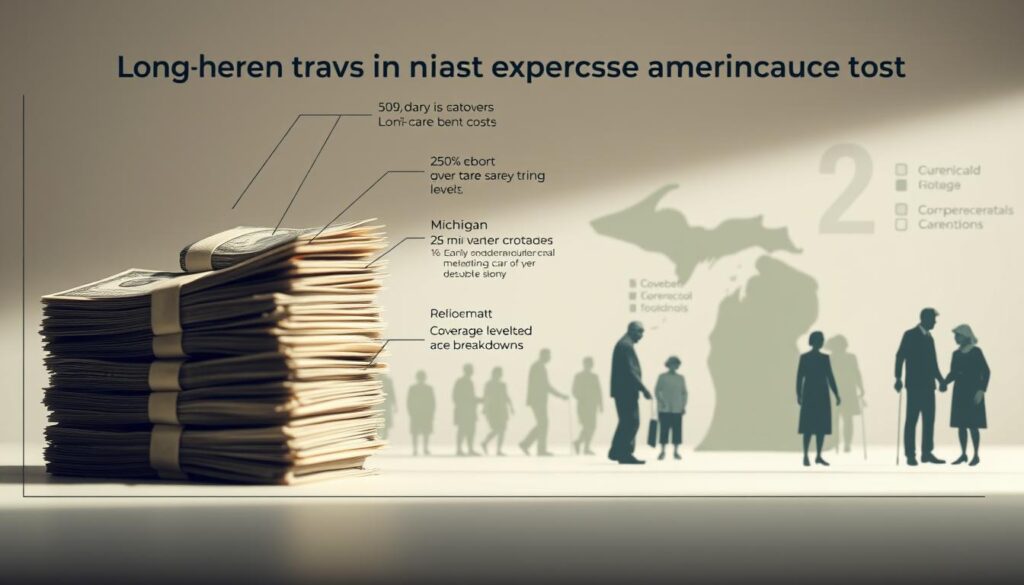As I approach retirement age, I’ve become increasingly concerned about protecting my hard-earned savings from potentially devastating long-term care costs in Michigan.
The statistics are sobering – there’s a 70% chance that someone turning 65 today will need some form of long-term care services, and in Michigan, these costs can quickly deplete retirement savings.
The average three-year cost of long-term care in Michigan is $328,500, making it essential to understand my insurance options for financial protection.
Long-term care insurance offers a solution that can help maintain my independence and ensure I receive quality care without burdening my family.
Key Takeaways
- Understanding the likelihood and costs of long-term care in Michigan.
- The importance of long-term care insurance in protecting retirement savings.
- Exploring policy types and state-specific programs available.
- Maximizing benefits through Michigan’s Long-Term Care Partnership Program.
- Determining the right insurance policy for individual needs and budget.
Understanding Long Term Care Insurance Michigan
The importance of long-term care insurance for Michigan retirees cannot be overstated. As healthcare needs evolve, understanding the nuances of long-term care insurance is crucial for financial planning.

What is Long-Term Care Insurance?
Long-term care insurance is designed to cover the costs associated with long-term care services, which are not typically covered by traditional health insurance plans or Medicare. It provides financial support for individuals who require long-term assistance with daily living activities.
The Rising Costs of Long-Term Care in Michigan
The cost of health care and long-term care services in Michigan is rising. As a result, it’s essential to consider how to pay for these costs. Long-term care insurance can help mitigate the financial burden.
Why Traditional Health Insurance and Medicare Fall Short
Many Michigan residents mistakenly believe that Medicare will cover their long-term care needs. However, Medicare only covers limited skilled nursing care for up to 100 days following a qualifying hospital stay. Here are key points to consider:
- Traditional health insurance plans are designed to treat acute medical conditions rather than provide ongoing custodial care.
- Medicare specifically excludes coverage for most assisted living facilities and home care services when the only care needed is help with activities of daily living.
- Medicaid does cover long-term care, but only after I’ve spent down nearly all my assets to meet strict financial eligibility requirements.
- Without long-term care insurance, I would likely need to deplete my retirement savings and possibly sell my home before qualifying for Medicaid coverage in Michigan.
Understanding these limitations is crucial when planning for the future.
Types of Long-Term Care Insurance Policies in Michigan
For those considering long-term care in Michigan, understanding the different types of insurance policies available is crucial for making an informed decision. Long-term care insurance is not a one-size-fits-all solution, and Michigan residents can choose from various policy types to suit their needs.
Home Care Only Policies
Home care only policies provide coverage for individuals who wish to receive care in the comfort of their own homes. These policies typically cover services such as bathing, dressing, and managing medications. By opting for home care, individuals can maintain their independence and receive the care they need without having to move into a care facility.
Nursing Home & Residential Care Facility Policies
Nursing home and residential care facility policies are designed for individuals who require a higher level of care. These policies cover the costs associated with residing in a nursing home or residential care facility, providing access to 24-hour care and support.

Comprehensive Long-Term Care Insurance
Comprehensive long-term care insurance policies offer the most flexibility, covering both home care and facility care. This type of policy allows individuals to choose the care setting that best suits their needs, whether that’s at home or in a care facility. Comprehensive policies provide peace of mind, knowing that you’re covered regardless of where you receive care.
Hybrid Long-Term Care Insurance Policies
Hybrid LTCI policies combine long-term care coverage with either life insurance or an annuity, addressing the “use it or lose it” concern associated with traditional LTC insurance. These policies provide a death benefit if long-term care benefits are not used, and they often come with premium guarantees and return of premium options. Hybrid policies are gaining popularity in Michigan due to their flexibility and added benefits.
| Policy Type | Coverage | Key Benefits |
|---|---|---|
| Home Care Only | Care at home | Maintains independence |
| Nursing Home & Residential Care Facility | 24-hour care in facilities | Access to round-the-clock care |
| Comprehensive | Both home and facility care | Flexibility in care choices |
| Hybrid | LTC + life insurance or annuity | Death benefit, premium guarantees |
Factors That Influence Michigan Long-Term Care Insurance Costs
When planning for long-term care insurance in Michigan, understanding the factors that influence costs is crucial for making informed decisions. The cost of my long-term care insurance plan will be determined by several key factors that I need to consider carefully.
Age and Health Considerations
My age and health status play a significant role in determining the cost of my long-term care insurance. Generally, the younger I am when I purchase a policy, the lower my premiums will be. Additionally, my health at the time of application can impact my eligibility and the premium rate I receive.
Coverage Options and Benefit Periods
The options I choose for my coverage, including the benefit period and the level of care covered, will also affect my premiums. A longer benefit period or more comprehensive coverage will typically increase the cost of my policy. I need to balance my needs with the cost to ensure I have adequate coverage without overpaying.
Inflation Protection and Waiting Periods
Inflation protection is a critical consideration for my long-term care insurance, as it helps my benefits keep pace with the rising cost of care over the years. The waiting period, or elimination period, I select will also impact my premiums. A longer waiting period can reduce my premiums, but I must have sufficient savings to cover the initial care costs.

| Factor | Impact on Cost | Considerations |
|---|---|---|
| Age | Premiums generally lower for younger applicants | Purchase policy early to save on premiums |
| Health Status | Health issues may increase premiums or impact eligibility | Apply when healthy to secure better rates |
| Coverage Options | More comprehensive coverage increases cost | Balance needs with cost considerations |
| Inflation Protection | Compound inflation protection increases premiums but maintains benefit value | Consider historical care cost inflation rates (3-5% annually) |
| Waiting Period | Longer waiting period reduces premiums but requires more out-of-pocket expenses initially | Choose a waiting period based on financial readiness |
Michigan’s Long-Term Care Partnership Program
The Michigan Long-Term Care Partnership Program offers a unique solution for managing long-term care costs. This program is designed to help individuals protect their assets while ensuring they receive the care they need.
How the Partnership Program Protects Your Assets
The Partnership Program allows you to protect your assets through a feature known as “Asset Disregard” under Michigan’s Medicaid program. This means that the amount of long-term care benefits received under a qualified partnership policy is disregarded when determining your eligibility for Medicaid. For instance, if your policy pays $450,000 in benefits, you can shelter that amount when computing your eligibility for Medicaid Long-Term Care benefits. This enables you to retain a significant amount of assets and savings above the minimum asset allowance.
Medicaid Asset Protection and Estate Recovery
The Partnership Program not only protects your assets during your lifetime but also shields them from Medicaid estate recovery after your death. This means that the protected assets can be passed to your heirs without being claimed by the state to recover Medicaid expenses. For married couples, the program can significantly increase the amount of protected assets, preserving retirement accounts, investments, and other significant assets.
Without a Partnership policy, Medicaid eligibility in Michigan typically requires spending down assets to $2,000 for an individual. However, with the Partnership Program, you can maintain a larger portion of your assets. The program’s policies must meet specific requirements, including consumer protections against inflation and unintentional lapse, ensuring the policies maintain their value over time.

Finding the Best Long-Term Care Insurance in Michigan

The quest for the best long-term care insurance in Michigan can be daunting, but with the right information, it’s achievable. To secure your retirement, it’s essential to understand the various aspects of long-term care insurance.
Average Costs and What to Expect
Understanding the average costs of long-term care insurance in Michigan is crucial. The costs can vary based on factors such as age, health, and the type of policy. On average, premiums can range from $2,000 to $4,000 per year. It’s essential to expect potential rate increases and understand the factors that influence them.
Comparing Quotes from Top Providers
To find the best policy, it’s vital to compare quotes from multiple top providers. Compare policies between at least two companies and agents to ensure you’re getting the best coverage. Ask your agent for the issuing company’s personal worksheet, which will show premium information and the rate increase history for the policy.
Working with a Specialized Insurance Agent
Working with an agent who specializes in long-term care insurance can provide you with deeper expertise and access to more options in the Michigan market. Specialized agents can help navigate complex policy features and translate insurance jargon into clear explanations. They will also provide you with each company’s rate increase history, claims payment record, and financial stability ratings.
Making Your Long-Term Care Insurance Decision
When consideringlong-term care insurancein Michigan, it’s essential to weigh the costs against the potential financial risks of uninsuredlong-term careexpenses. As I reflect on my retirement goals, I must consider the importance oflong-term care insuranceto safeguard my financial security.
To make an informed decision, I need to balance the cost of premiums against the potential financial devastation that uninsuredlong-term care expensescould cause to my retirement security. The ideal time to purchaselong-term care insuranceis typically between ages 55-65. If I’m married, I should consider whether individual policies or a shared-benefit policy makes more sense for our situation.
Beyond financial considerations, I should reflect on the peace of mind that comes from knowing I’ve planned for my care needs.Long-term care insuranceis ultimately about protecting my independence and dignity in later years. I should explore hybrid policies if traditionallong-term care insurancepremiums seem unaffordable. Whatever policy I choose, I should ensure my family understands what coverage I have and how to initiate a claim.
The decision to purchaselong-term care insuranceis highly personal and depends on my health history, family longevity, and retirement assets.
